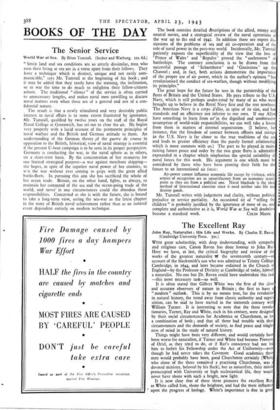BOOKS OF THE DAY
The Senior Service
World War at Sea. By Brian Tunstall. (Seeker and Warburg. 12s. 6d.)
" SINCE land and sea conditions are so utterly dissimilar, men who earn their living at sea are in a sense apart from their fellows. They have a technique which is distinct, unique and not easily com- municable," says Mr. Tunstall at the beginning of his book ; and it may be added that they rarely have the training, the inclination, or in war the time to do much to enlighten their fellow-citizens ashore. The traditional " silence " of the service is often carried to unnecessary lengths, and makes naval men unwilling to discuss naval matters even when these are of a general and not of a con- fidential nature.
' The result is that a newly stimulated and very desirable public interest in naval affairs is to some extent frustrated by ignorance. Mr. Tunstall, qualified by twelve years on the staff of the Royal Naval College at Greenwich, has set out to clear the air. He begins very properly with a lucid account of the permanent principles of naval warfare and the British and German attitude to them. An understanding of the German theory of the guerre de course in opposition to the British, historical, view of naval strategy is essential if the present U-boat campaign is to be seen in its proper perspective. Germany is conducting the war, in the naval sphere as in others, on a short-term basis. By the concentration of her resources for one limited strategical purpose—a war against merchant shipping— she hopes, in spite of the superior naval power of her enemies, to the war without ever coming to grips with the great allied battle-fleets. In pursuing this aim she has sacrificed the whole of her ocean trade. Britain, on the other hand, fights, as always, to maintain her command of the sea and the ocean-going trade of the world, and never* in any circumstances could she abandon these responsibilities. Concerned as she is with the future, she is bound to take a long-term view, seeing, the sea-war as the latest chapter in the story of British naval achievement rather than as an isolated event dependent entirely on modern technique. The book contains detailed Ascriptions of the allied, enemy and neutral navies, and a strategical review of the naval operations of the war up to the end of 1942. In addition there ate expert dis- cussions of the problems of sea and air co-operation and of the role of naval power in the post-war world. Incidentally, Mr. Tunstall patiently exposes the superficiality of the view that the loss of ' Prince of Wales ' and ' Repulse ' proved the " uselessness " of battleships. The contrary conclusion, is to be drawn from the successful passage of Scharnhorst' and Gneisenau ' up the Channel ; and, in fact, both actions demonstrate the importance of the proper use of air power, which in the author's opinion " has revolutionised the conduct of sea-warfare, though without modifying its principles."
The great hope for the future he sees in the partnership of the fleets of Britain and the United States. He pays tribute to the U.S. Navy, which is still perhaps under-rated by many of us who were brought up to believe in the Royal Navy first and the rest nowhere. The American Navy is a corps d'ilite, in spite of its size, and has standards and an efficiency not inferior to our own. If our Allies have something to learn from us"in the dignified and unobtrusive assumption of world-wide responsibilities, we can well take a lesson from them in matters of internal organisation. (I believe, for instance, that the freedom of contact between officers and ratings in the U.S. Navy is far closer to the true traditions of the sea and leads to greater efficiency than the purely formal relationship which is more common with us.) The part to be played in main- taining future peace and order by the two great fleets is admirably expounded in a chapter which emphasises the special suitability of naval forces for this work. His argument is one which must be considered by those who have been pinning their faith for the future to an international air force: Air-power cannot influence economic life except by violence, while armies of occupation are as unsatisfactory from an economic stand- point as they are from a political one. Naval blockade is the idea method of international coercion since it need neither take life n destroy goods.
Mr. Tunstall writes with judgement and clarity, without politi prejudice or service partiality. An occasional air of " telling th children " is probably justified by the ignorance of most of us, an complete and authoritative as it is, World War at Sea will doubtle


























 Previous page
Previous page